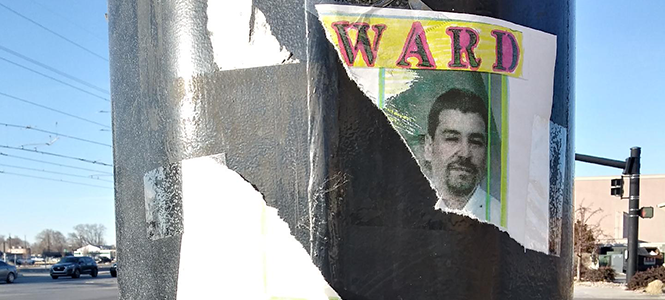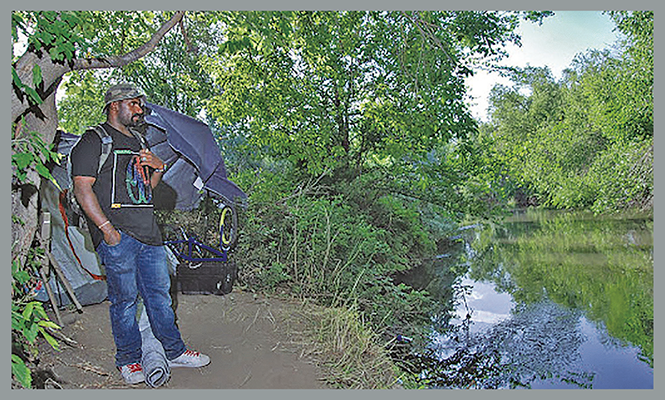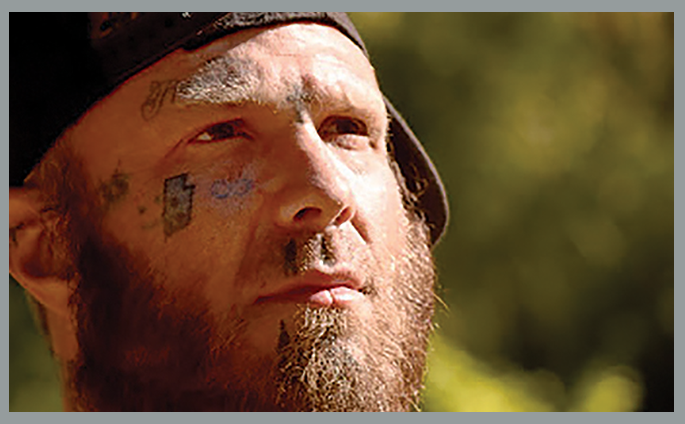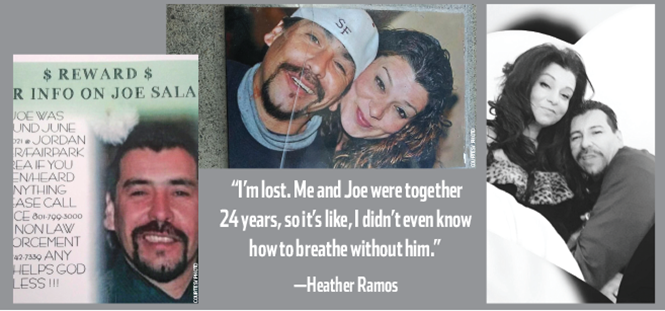Murder on the River
Critics say a lack of trust between police and the homeless community is to blame for an unsolved homicide.
By Eric S. Peterson @ericspeterson and Bethany RodgersThe following story was funded with support from The Economic Hardship Reporting Project and was reported by the Utah Investigative Journalism Project in partnership with City Weekly.
Joe Salas was in a dark mood when he said goodbye to his wife at the North Temple Trax station and headed north along the Jordan River Trail on June 7, 2021.
Walking along the river was likely calming for Salas. He had always been an outdoorsman, taught his children to hunt and fish and wowed them with his ability to crouch by a riverbank and pull a trout out with his bare hands.
Salas, for the most part, led a life of optimism. And while things weren't always easy, he had two children whom he loved to spoil and a wife of 24 years. He was a dreamer, too, with plans of opening his own taco stand or snow-cone shack always kicking around in his head. Once, he'd crafted a fishing pole that would glow when struck by a biting fish, and he figured maybe he had just come up with a million-dollar invention.
But lately, the future he'd dreamed of seemed to rush past him on a dark and swift current. For two years, he and his wife had been homeless after West Valley City bought up the properties on their street to make way for new development. Salas and his wife had saved some money, but struggled to find any affordable housing. Meanwhile, rental application fees ate away at their funds and, soon, they were bouncing between motels and shelters waiting for subsidized housing to come through.
And on June 9, 2021, everything Salas was and wanted to be—everything left unfinished and unsaid—came to an end along the banks of the Jordan River. He was stabbed repeatedly and killed by an unidentified attacker who fled, unseen by any witnesses.
Salas' body was found across from the grounds of the Utah State Fairpark, just north of a pedestrian bridge where ducks and geese usually float idly by in the brackish water. Further down that stretch of trail, many of the city's homeless pitch their tents, nestled between cottonwood trees and tall grass.
Here, the homeless campers usually see police only when they're arrested or when their camps are flattened and destroyed during health department abatements.
"I don't think the police really care when the victims are homeless," said Wendy Garvin, a homeless advocate with Unsheltered Utah. "They primarily assume that no one will help them and then just walk away from it."
The Utah Investigative Journalism Project spoke with more than a dozen people experiencing homelessness and who choose to camp outdoors rather than use city shelters. The overwhelming majority described a complete lack of trust in law enforcement.
"Erin"—who asked that her name be changed for this article—was aware of the murder of Joe Salas. "My heart goes out to his family," she said. "No one should have to grieve that type of a loss and not have any answers."
But when asked if police had, in recent months, tried to interview campers about the case, Erin was uncertain. "I'm not sure, because when they come, we just up and run," she said.
Crime and Community
Dressed in all black and gray, despite the blistering heat, Jared—who asked to be identified only by his first name—said he doesn't view the police as a source of protection for himself or other folks living on the river.
He had stopped to talk with a reporter in the shade outside Cottonwood Park—over Pixy Stixs and Dr. Pepper—along with his friend John, who had found a secondhand copy of Chuck Palahniuk's Fight Club. From memory, Jared recited passages from Palahniuk's other works.
"They dehumanize us, but now they also dehumanize themselves," Jared said of the police, noting how officers dealing with homeless individuals typically display a number instead of a name tag. If someone had a complaint against an officer, Jared said, it's unlikely they'd remember a jumble of numbers and letters.
Salt Lake City Police spokesman Brent Weisberg said in an email that the department started allowing officers to not show their names for safety reasons during the "civil unrest" of 2020, stemming from the death of George Floyd in Minnesota.
"The Office of the Chief is currently exploring [whether] to transition officers back to displaying their name. As we transition back, some officers have needed to reorder the Velcro nameplate and we, like many other organizations and people, are dealing with supply chain issues," Weisberg said. He added that every officer is required to give his or her name and number when asked.
Camp abatements have also strained relations between residents and police. Joshua McColloch, who goes by "Eight," was outraged at a recent abatement, when he watched officers demolish the camp of a disabled, elderly woman.
"Why is it against the law to live?" he asked.
A request to speak with an officer about interactions with people experiencing homelessness was declined, but in a prepared statement, Weisberg said that police work closely with all stakeholders. Detectives often partner with patrol officers to find and help crime victims and witnesses in camps and shelters across the city, he said.
"We are committed to ensuring justice for everyone, which is why we invest so heavily in making sure we can provide crime victims advocacy and resources to navigate the criminal justice system," the statement said. "Our victim advocates work closely with detectives and patrol officers to help coordinate transportation for people who may not have access to immediate private transportation."
Garvin said the cooperation has faltered in the past. She provided email correspondence she had with police in April 2021, when members of a homeless camp were looking for police to help with an individual who was attacking women there. While residents were ready to provide testimony, the police never showed up, Garvin said. The last she heard was that the individual terrorizing the camp was arrested only after he later vandalized a nearby restaurant.
"Erin" said women at the river camps don't go out at night for fear of attackers. And the department did not provide comment when asked about the lack of police response to the April 2021 incident.
Garvin said another shelter is needed, since existing facilities don't support couples—unless they want to be separated by seven miles every night—or people with pets or children with special needs.
Many people experiencing homelessness also cycle between jail, prison and the street, so there is often a large gang presence in the shelters that can make it dangerous.
"For a lot of us, we can't do the whole shelter experience," said Erin. "My anxiety and depression skyrockets [there]."
But the river is no utopia, Jared admitted, with sexual assaults and other acts of violence happening often and going unreported.
"It's so frequent it makes you sick," Jared said.
Still, he said for those in a group that look after one another, it can be a home. He recalled being awakened one night to the panicked screams of a man down the river.
Jared and his campmates all climbed out of their tents in the darkness to see who was in trouble. The screaming man was having a mental-health crisis, Jared said, but wasn't in any physical danger.
"Here was this guy screaming for help with houses right there and nobody came from them to help," he said. "No police were called and if they [were], they didn't show up."
If, however, a business or homeowner complains about a homeless person, Jared said the police are there in a heartbeat.
"Crimes here are considered 'homeless' until proven otherwise," in Jared's words.
Bad Days, Good Lives
The Utah Investigative Journalism Project received data from the police department showing that from June 2020 to June 2022, officers were dispatched 10,811 times on "transient problem" calls in Salt Lake City. Records show 882 of those were to assist other agencies, like the fire department on medical calls. Another 680 dispatches were for cases of trespassing and 277 were for complaints about camps.
The overwhelming majority of instances—8,256, or 76%—resulted in no reportable criminal activity. Serious crimes like homicide and selling drugs, as well as minor crimes like drug possession and disorderly conduct, accounted for less than 1% of dispatches.
It's also unclear how many bodies in recent years have washed up on the banks of the Jordan River. The homeless community will cite numbers ranging from three to dozens. Salt Lake City Police identified Salas and two other bodies recovered since 2019, but said a full accounting would require a lengthy consultation of their records.
Not all people experiencing homelessness distrust the police. On a sun-parched camp on the western edge of the city and south of the airport, Mariel—who asked that only her first name be used—recalled waking in her tent one morning as a strange man attempted to rape her. She fought him off with a flyswatter and immediately went to the police, who quickly apprehended him.
While crime abounds at the camp, Mariel said residents aren't lawbreakers so much as they are just broken people suffering from addiction and mental-health issues. "It's not bad people," Mariel said, "it's the depression."
Her friend Raphael Bustamante worried less about police and more about people having to scratch out an existence lacking access to water and sanitation. He, like others, relies on the generosity of friends at camp, like Mariel. "She has heart," Bustamante said. "The government has no heart. They don't give a shit about us."
Advocates have long called for increased state support for homeless services and were enraged earlier this year when the Legislature slashed more than $70 million from Gov. Spencer Cox's $128 million request for homeless housing. The cut was particularly stinging because providers viewed this year as a generational opportunity to invest in this service area, with the state awash in federal pandemic money.
Andrew Johnston, Salt Lake City's Homelessness Policy and Outreach director, said he hopes that more resources could be marshaled to convert motels and hotels into housing for the approximately 400 homeless individuals currently living outdoors.
"I think we could buy some hotels pretty quickly and renovate them if we would agree to do it," Johnston said.
"I think our [homeless] numbers compared to other metropolitan areas in, say, the West are low enough where we could do that, and I think we should do that," Johnston continued. "It's a matter of getting everybody on board to do it."
For Chandler and Caitlin, a young married couple who asked only to be identified by their first names, the Jordan River is home, and their camp is family.
Chandler comes off like a cross between a Viking and a bicycle mechanic. He has a steely demeanor for newcomers that appears at odds with the decor of his bicycle, covered as it is with stuffed unicorns.
"People are so f—king judgmental," he said of the unicorns. "I'm not sure now if I do it because I really like unicorns that much or if I'm just sticking it to people."
Caitlin is always close by his side with a cigarette and her D.A.R.E. tank top and gray sweats. She said the unsheltered life transcends everything else. Members of their group include all races, and you can find former white supremacists breaking bread with Latinos, Blacks and Pacific Islanders.
They stick together, she said, because they can't rely on the police for protection. "They've literally told us they couldn't care less if we're dead or alive," Caitlin said. "We're just an eyesore to them."
On a recent visit, Chandler spoke with reporters while working nonstop fixing a bike and then mending the binding of a journal with some tape and a lighter. "Being an Eagle Scout has applied to my life more than anything," Chandler joked.
Their camp exists on a different plane than "the normals"—families on picnics and people walking their dogs through the park—he said. When normals come by, everyone stashes needles and paraphernalia out of sight. Their outdoor life has its own rhythm and a raw freedom that comes with peril and uncertainty.
"We never know what will happen," Chandler said. "Today could be the day our shit gets stolen. It could be the day we get arrested. It could be the day we die."
Still, he and his wife live by a motto they developed from taking acid. When it was clear a friend was having a bad trip, they would help him or her through it, saying "It's a bad minute, not a bad trip." It's something they've modified for their life outdoors.
"It's a bad day, not a bad life," Caitlin said.
Floating By
Heather Ramos—Joe Salas' widow—has lived in a "floating" kind of nonexistence ever since his death, she said. Every day is ritualized around his memory.
She leaves flowers at a tree in a West Valley park where they used to meet up. On a good day, she can distribute 200 to 400 flyers at the mall and in grocery store parking lots looking for tips to find his killer.
"I'm lost," she said. "Me and Joe were together 24 years, so it's like, I didn't even know how to breathe without him."
The flyers get torn down, and she picks up the ripped pieces and keeps them—she can't even let go of the torn images of his smiling face. The photo she uses is from an old family Christmas party because Salas loved Christmas and shared his holiday spirit by taking fruit baskets to his neighbors when they had their home in West Valley City.
The family suffered something worse than a bad day when he was murdered, but they continually fight to remind people of the good life he led for his family and friends. Alexia Ramos was technically his stepdaughter, but knew him as her dad since she was 1 year old. She said he was so delighted to be around babies and toddlers and show them the world.
"He liked the wonder that kids have," Alexia recalled of Joe Salas. "When [they're] introduced to new things you can see the innocence and beauty of that. He liked that and liked to be a teacher."
The family said that was clear in the joy he took in teaching his family how to hunt and fish or ride a bicycle. "It makes me angry that somebody can just come along and just steal that away from the little kids like that," Heather said.
Heather recounted the time she went back to school to get her GED and certification to do medical billing. Salas watched the kids while she went to school and quizzed her with flashcards about medical terminology to help her pass her test. "He was right there backing me up all the way with anything and everything," she said.
Salas' sister, Carmen Granados, echoes the point about her brother's generous spirit. But she says he always struggled to ask for help himself. Granados offered to let him move into her place when he was forced onto the street, but he refused.
But he would come by to pick up clothes that Granados would wash for him. He was likely headed to her house before he died. "He always tried to make it on his own," Granados said, adding that he reminded her of what their father had taught them: "We have to work for what we want."
Heather's 6-year-old grandson sleeps with a container of Salas' ashes, she said, and the boy told her once that he wanted to die so he could see his grandpa in heaven. She had to gently tell him that Salas would want to make sure he grows up to have his own family, and the boy then told her he would name his own son after "Grandpa Joe."
Both Alexia and Heather said they've had only intermittent contact with police. "I feel like we're just another number, because we don't get called back at all," Alexia said.
The police declined to dredge the river looking for the weapon, so Alexia bought a river magnet and would troll the Jordan River herself. She even hauled out a shopping cart full of boots. Her brother searched up and down the banks trying to find the crime scene.
Death and life for those on the river often goes unnoticed. For "Erin," she only hopes citizens of Salt Lake City would recognize the humanity of those trying to survive on the river banks. And she feels that an already-aggressive police presence has only increased this year (after new members of the Salt Lake City Council were elected).
"If I were to send them a message, it would be to open your eyes and realize not all of us are out here because we want to be," Erin said. "Every story is different here. And it is hard to get into any kind of place that is anywhere near affordable."
That's the reality that led the Salas family into homelessness and to the ultimate tragedy that they still relive daily.
After Joe Salas' funeral was over, and family and friends started to return to their own lives, Alexia dreamed her father came to visit her, and she was so excited she took pictures with him. But when she showed her mother the photos, her dad was gone.
He had just faded away.
Prior to being found dead on June 9, 2021, Joe Salas was last seen wearing jeans, white Adidas sneakers and carrying a large red hiking/camping backpack. Anyone with information is encouraged to contact Salt Lake City Police at 801-799-3000 or private investigator Jason Jensen, who is helping the family, at 801-759-2248. A cash reward is offered for information that leads police to the identity of those responsible for Salas' death.
More by Eric S. Peterson
-
The Secret Sauce
How Utah lawmakers disclose—or don't disclose—conflicts of interest.
- Feb 14, 2024
-
Police departments in Salt Lake County spent almost $20 million on civil rights complaints in the past decade
The Co$t of Mi$conduct
- Oct 18, 2023
-
Women decry harassment and toxic culture at St. George auto dealership
Men at Work
- Oct 11, 2023
- More »
Latest in Cover Story
Readers also liked…
-
Forget the family pedigree—Robert F. Kennedy Jr should not be the next president of the United States
Trojan Horse
- Jun 21, 2023
-
Women decry harassment and toxic culture at St. George auto dealership
Men at Work
- Oct 11, 2023








